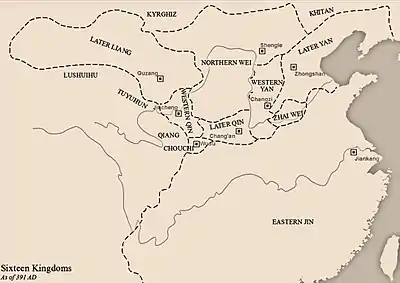Zhai Wei
Wei (Chinese: 魏; pinyin: Wèi) was a state of Dingling ethnicity that existed from 388 to 392, during the Sixteen Kingdoms period of Chinese history. It is often referred to as Zhai Wei (翟魏) to be distinguished from numerous other states named Wei in history. Its founder Zhai Liao had previously been vacillating between being a vassal of Later Yan, Western Yan, and Jin dynasty, and in 388, after his last overture to reconcile with Later Yan's emperor Murong Chui was rejected, he declared his own state, over the territory of modern central and eastern Henan. In 392, Wei, then under Zhai Liao's son Zhai Zhao, was destroyed by Later Yan forces. Because of its relatively small size and short lifespan, Wei is generally not included by historians among the Sixteen Kingdoms.
Wei 魏 | |||||||||
|---|---|---|---|---|---|---|---|---|---|
| 388–392 | |||||||||
 Zhai Wei in 391 AD | |||||||||
| Status | Kingdom | ||||||||
| Capital | Huatai | ||||||||
| Government | Monarchy | ||||||||
| Tian Wang | |||||||||
• 388-391 | Zhai Liao | ||||||||
• 391-392 | Zhai Zhao | ||||||||
| Historical era | Sixteen Kingdoms | ||||||||
| 387 | |||||||||
• Established | 388 | ||||||||
• Disestablished | 392 | ||||||||
| 393 | |||||||||
| |||||||||
| Today part of | China | ||||||||
The rulers of Wei used the title "Heavenly King" (Tian Wang).
Rulers of Wei
| Personal name | Durations of reign | Era names |
|---|---|---|
| Zhai Liao | 388-391 | Jianguang (建光) 388-391 |
| Zhai Zhao | 391-392 | Dingding (定鼎) 391-392 |
See also
References
- Theobald, Ulrich. "Chinese History - Dingling 丁零". chinaknowledge.de. Retrieved 2015-11-09.
- Historical Dictionary of Medieval China, p. 119, at Google Books
